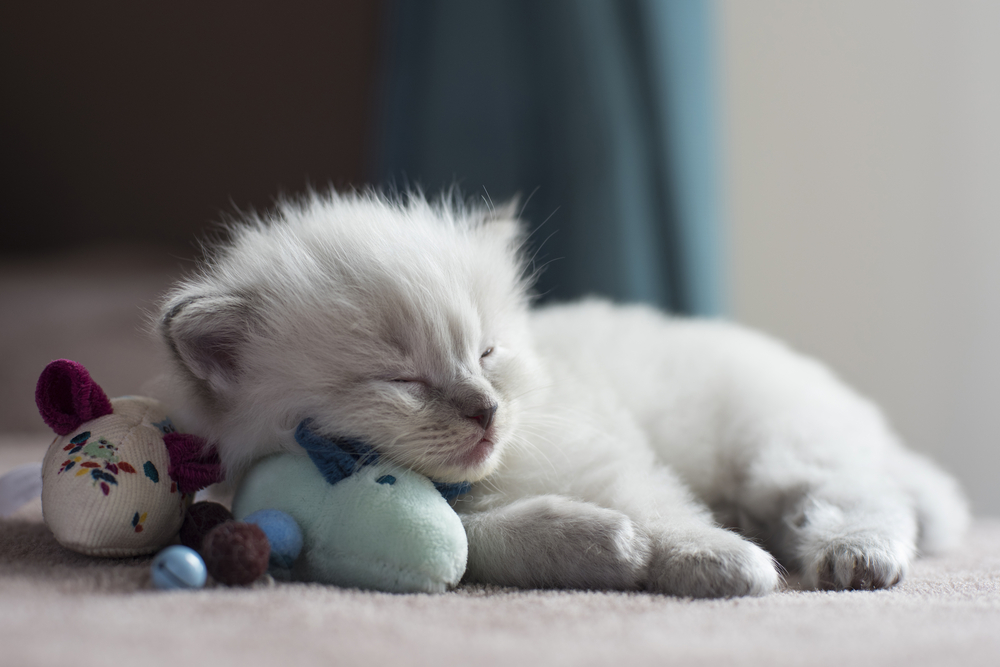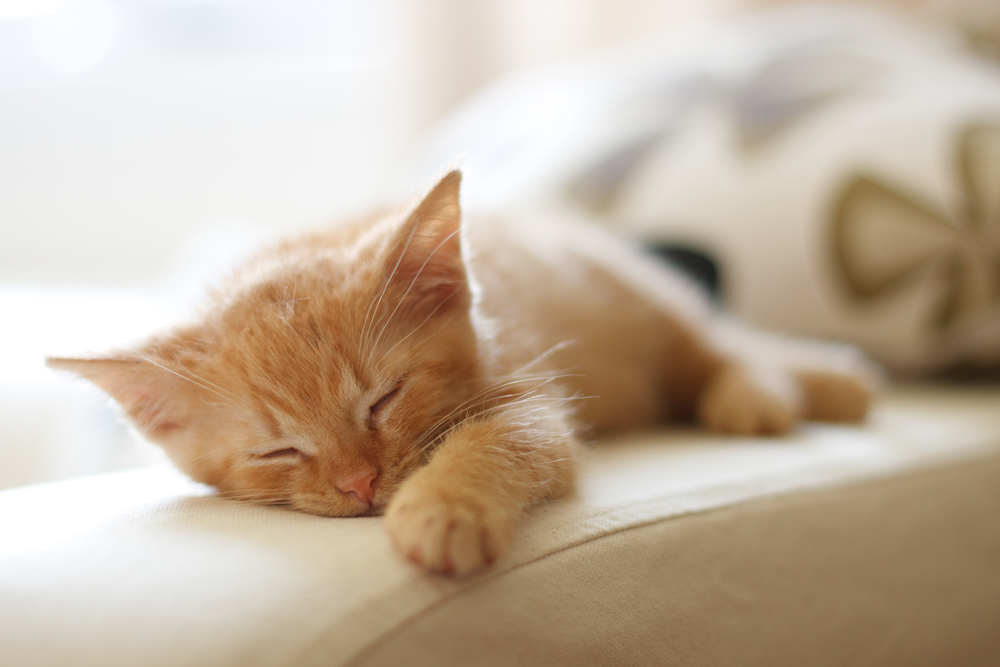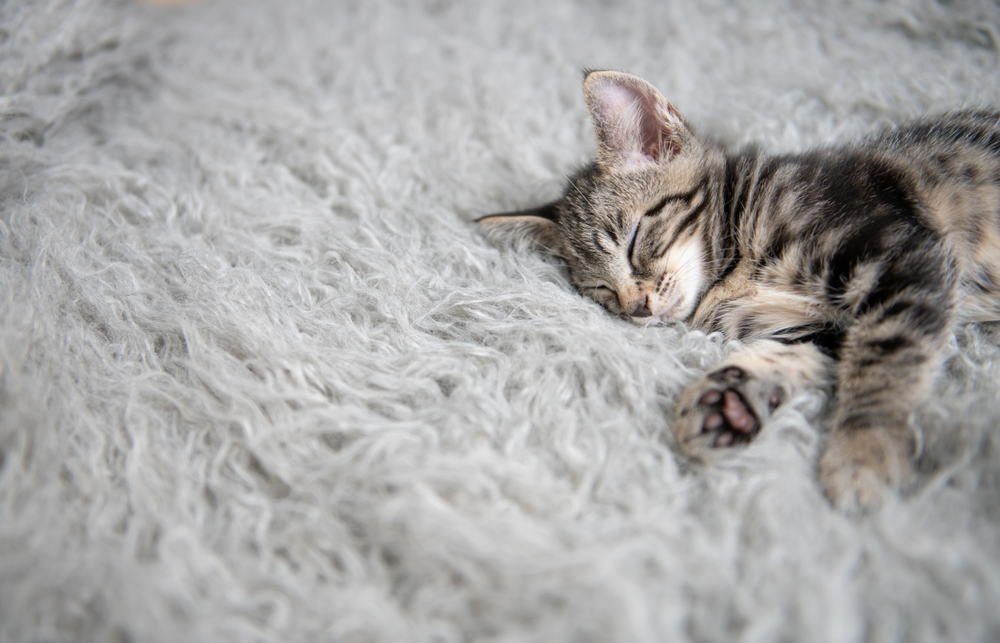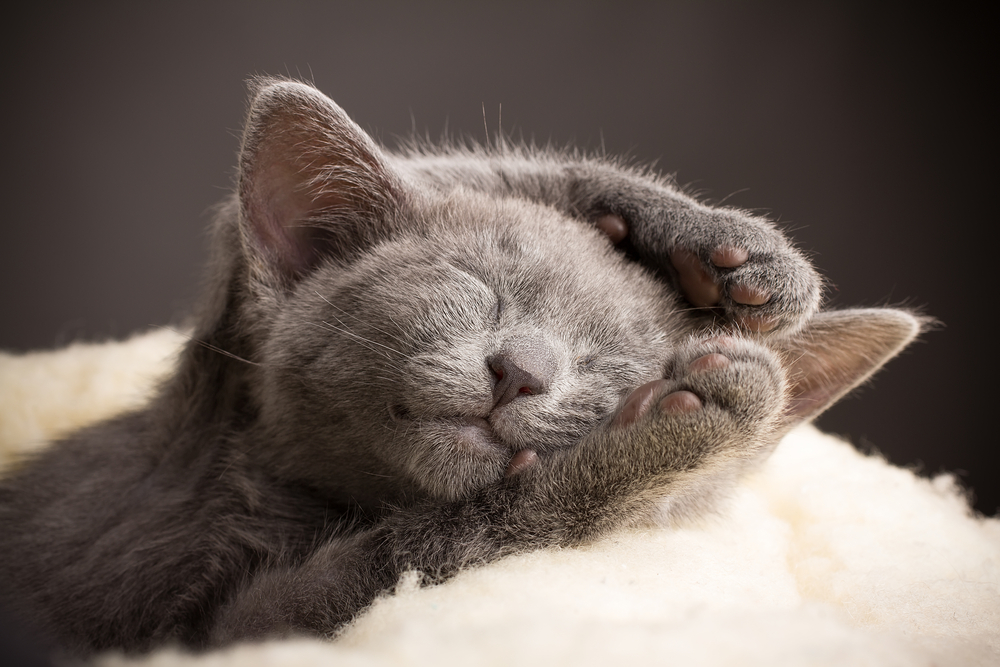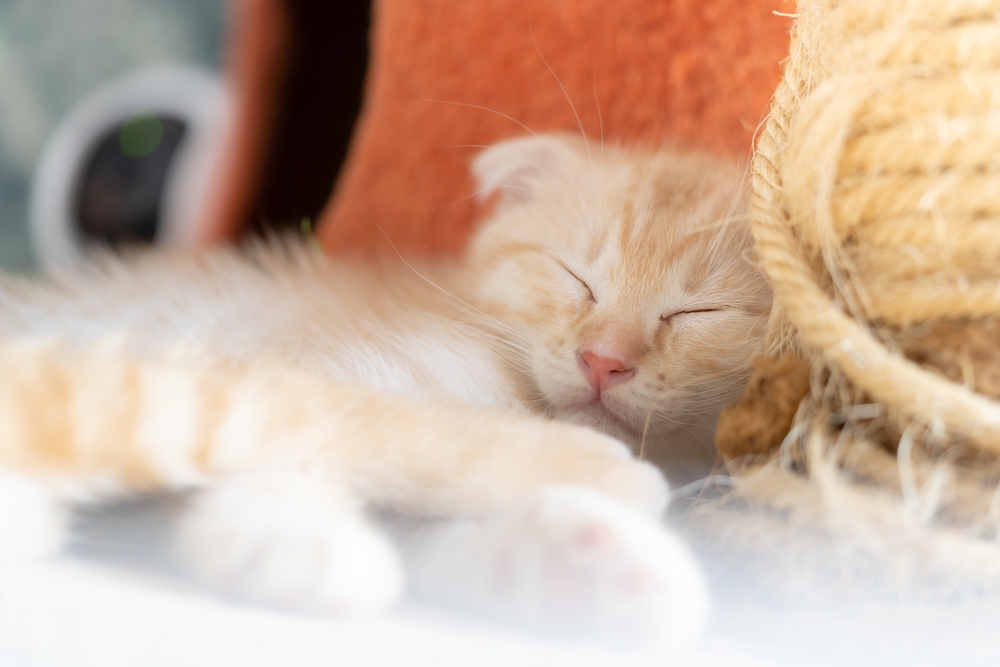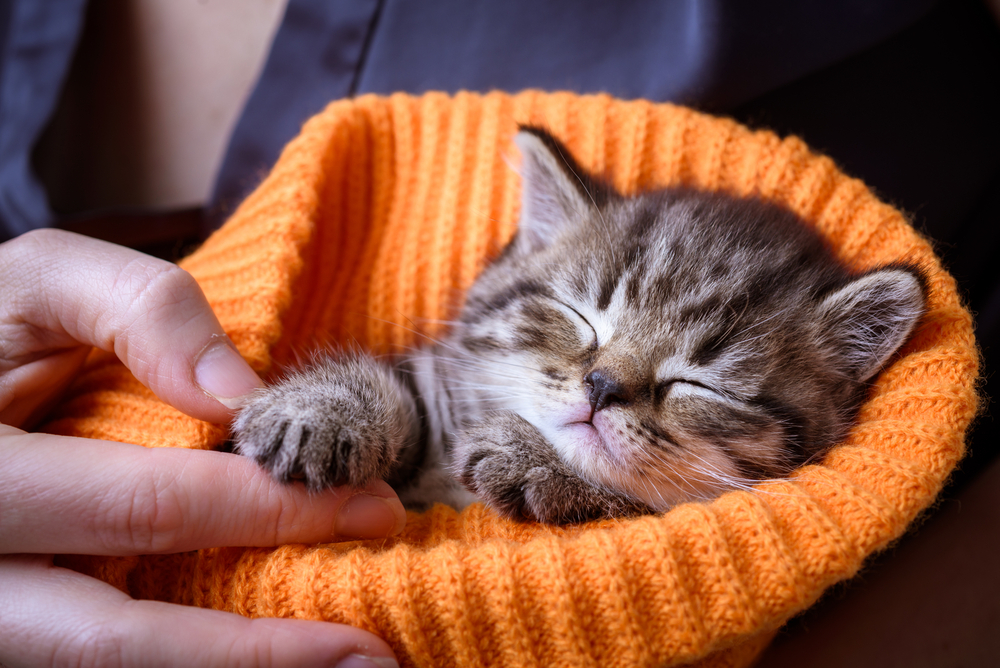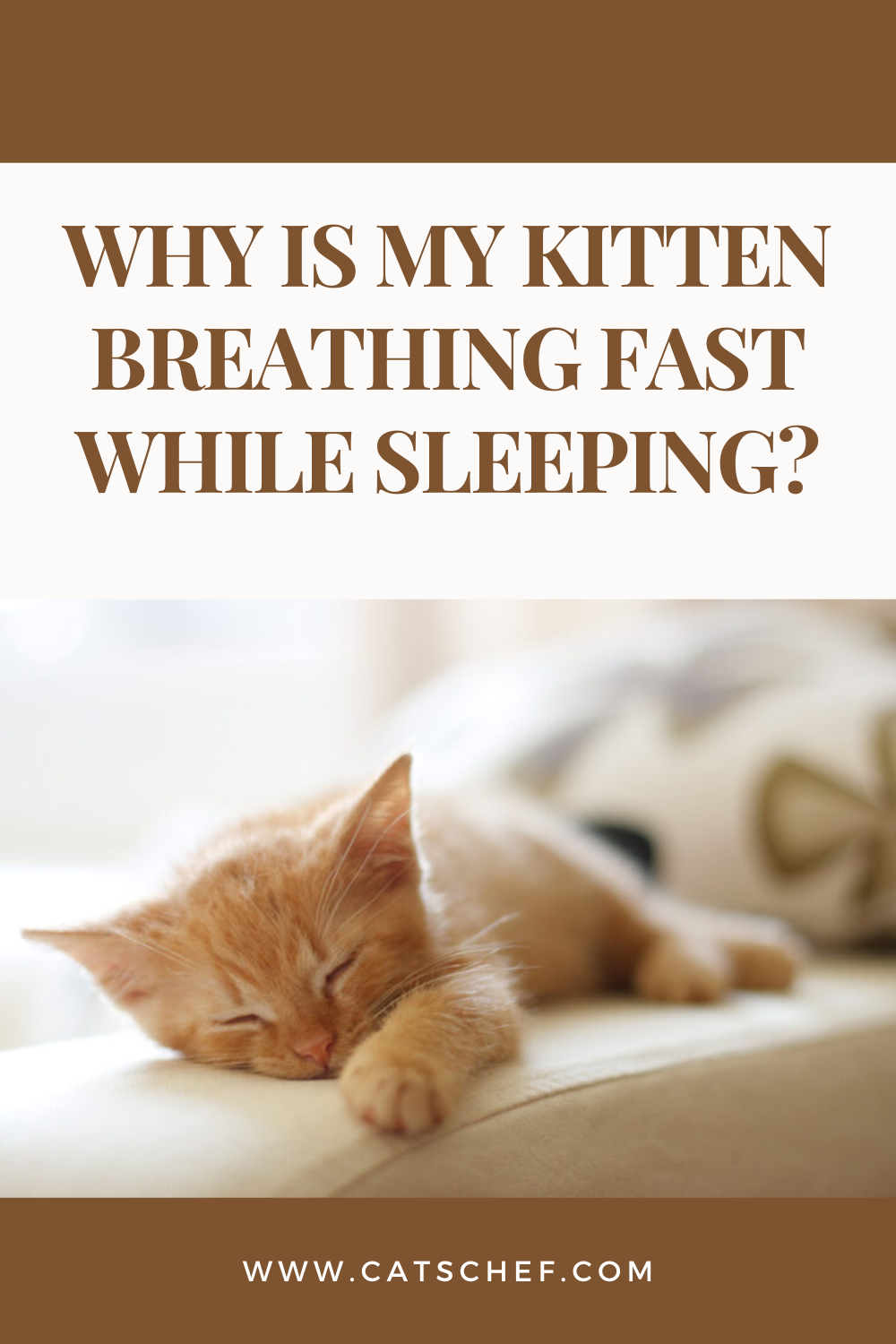📖 Table of Content:
You’re living the moment you’ve always imagined: curled up on your sofa, with a warm cup of tea in your hand, and your adorable fluff napping by your side. Everything seems purrfect, until you notice your kitten breathing fast while sleeping. Naturally, you begin to worry.
Is your furbaby okay? She looks so innocent and delicate, and you can’t imagine something bad happening to her. You want to protect her from all harm, and your mind starts coming up with all kinds of questions: Is this normal? Should I be concerned? Is she sick?
Take a deep breath, my dear friend. I know you’re worried about your fluff, but panic won’t get you anywhere. In the world of kittens, this phenomenon is pretty common, so don’t worry.
Did you know that our feline friends have dreams, too? Rapid breathing could be caused by her having an active one, while she’s snoozing next to you. Who knows, maybe she’s so excited to be running around with you in her dream that her small body can’t hide it!
There could be many reasons for this kind of behavior, of course, so why don’t we go into detail about why your kitten is breathing fast while sleeping. It will give you peace of mind, and you’ll be able to watch your fluffball napping without having to analyze every breath she takes.
Why is my kitten breathing fast while sleeping?
Although a kitten breathing fast while sleeping may seem like something you should worry about, it’s often not the case. As a first-time cat parent, I’m sure you analyze every change in your fluff’s behavior. After all, it’s your love and care that makes you your kitten’s favorite human.
Sometimes, however, it’s best to do some research or contact your vet before you go into full-on panic mode. First off, let’s discuss dreams. Yes, your kitten can dream, too! Her dreamland is full of exciting adventures, just like ours are.
Their dreams are probably full of laser pointers and hunting bugs. You may notice your kitty trying to run in her sleep, or even start breathing rapidly. Her action-packed dreams make her body react like those things are really happening! How adorable is that?
On top of that, rapid breathing is pretty common when cats enter the REM stage of their sleep, just as is the case with us. It can cause twitching, moving, hissing, and even fast breathing.
Of course, this could also be a sign of an underlying medical condition. Because your fluff is still young, it’s crucial to consult a vet with every change in her behavior. Naturally, kittens have a different breathing rate than older cats, and it’s important to keep that in mind, too.
Normal breathing rate for a kitten
You know how adult cats are the epitome of being chill? Well, their breathing is the same way, too. Adult kitties take nice, leisurely breaths that can calm down the most anxious hearts when you feel their tummies moving up and down on your chest. Kittens, on the other hand, are quite different.
Even when they’re wide awake, our adorable baby fluffs can breathe like they’re running a marathon! Normally, adult cats take around 10 to 30 breaths per minute while they’re relaxing. Our sweet kittens, however, have a resting breathing rate that goes anywhere from 18 to 34 breaths per minute.
Their rate can be even higher after an intense play session or if they’re having a bad dream. Moreover, just like dogs, cats can pant, too. Fun fact! Actually, they can pant up to 10 times faster than their normal rate. Because of that, catching your kitten breathing fast while sleeping isn’t always a cause for concern.
As long as their breathing stays under 34 breaths per minute on a regular basis, you shouldn’t worry. She’ll be okay. That’s her normal range, so you can go back to relaxing next to your furry bestie without worrying about having to rush her to the vet.
How do you test your kitten’s breathing rate?
Don’t worry, you don’t have to rack your brain about whether your fluff’s breathing is faster than what’s considered normal. You can test it out at home! You’ll have to do one thing every cat parent absolutely loves to do: Watch your furbaby sleep.
Wait until she’s in that blissful state of dreaming, without any crazy adventures that will make her toss and turn. Focus on her adorable small chest and tummy, and the way it gently rises and falls.
Grab your phone, set your timer for 30 seconds, and let your observation begin! During this short period, count how many breaths your little purrer takes. Reminder: Each breath includes both inhale and exhale!
After your timer goes off and you’ve got a number, multiply it by two to get a breathing rate per minute. It’s super easy! Of course, if you’d like a full minute without multiplying, you can set your timer to 60 seconds and count her every breath again.
If you’re worried your kitten may be sick, you should do this a couple of times over a few days, and save the number in your notes. That way, you’ll get a better picture of your furbaby’s normal breathing rate. If there’s anything out of the ordinary, it’s best to consult your vet about it.
When should I worry about my kitten breathing fast?
Although fast breathing in kittens isn’t always a cause for concern, there are cases when it can be. I know, the last thing you wanted to hear is that your fluff may be sick. It was probably the thing you feared the most, but it’s better to rule out some issues than to ignore them completely before it’s too late.
If during your observation your kitty’s breathing rate goes through changes, it may be a sign of something a lot more serious than just a bad dream. When you’ve noticed your kitty isn’t breathing normally, it’s time to contact the vet as soon as possible. Here are some potential causes.
1. Heart issues
Unfortunately, rapid breathing is sometimes a sign that your fluff’s heart may not be in the best condition. But don’t panic just yet, please. The good news is that this is pretty rare in young cats, especially if they’re not diagnosed with a heart condition, or don’t have a parent with one.
However, it’s always better to stay safe than sorry, so you shouldn’t ignore this possibility. If your furbaby is having difficulty breathing and you suspect it may have something to do with her heart, it’s important to schedule a vet check-up.
After all, heart issues can be serious, especially if left untreated. While it’s unlikely that your kitten’s fast breathing is caused by a heart problem, it’s good to rule it out by having her undergo a proper examination. At least you’ll get some peace of mind.
2. Anemia
Did you know that our feline friends can be anemic, too? Anemia in cats happens when your fluff’s immune system starts attacking its own red blood cells. When this happens, your kitty gets less oxygen, causing her to breathe like she’s always running late to class.
But there is some good news. Although anemia can be pretty serious, it can be dealt with properly if it’s treated on time. With the right treatment plan and medication, your fluff’s anemia can be treated or even completely cured!
Because of that, it’s crucial to take her to the vet the moment you start suspecting this may be the case. If you notice your fluff breathing like she just had an intense playing session even though she’s been napping for an hour now, it may be a sign her blood cells are not in the best condition.
Don’t panic. Take your dear kitten to the vet, explain everything you’ve noticed, and let them give her the right treatment that will help her live the long and healthy life she deserves.
3. Lung issues
Sometimes, fast breathing can be a sign that there may be something wrong with her little lungs. This is pretty rare, though, so don’t panic. Even if it happens, it’s usually not a big deal and can be easily treated. The most important thing is to act once you first start noticing the symptoms, such as rapid breathing.
If not treated on time, kittens may develop a lot more serious conditions. In worst-case scenarios, it could cause bleeding in the lungs, which could be a much bigger problem. But, let’s not think that far ahead, and deal with what’s at hand right now.
Keep an eye on other symptoms other than fast breathing. Coughing, fatigue, and struggling to breathe while playing or napping are all signs that you should take action. Don’t wait too long before you decide to take a trip to the vet. The sooner the better!
